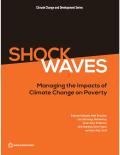Ethiopia has embarked on a national strategy of building a climate-resilient green economy. This model therefore does not focus only on mitigation strategies, but it also valorises the importance of improving climate-resilience, described as the ability to anticipate and adjust to climate change risks. In particular, the need to transit to a green economy model that is more inclusive is receiving growing attention as a pathway that can lead to sustainable development.
This report explores the linkages and contribution of inclusive green economy policies and strategies to structural transformation in Ethiopia. In this regard, the report provides an assessment of how inclusive green economy-related policies can reinforce the structural transformation agenda of Ethiopia; and how structural transformation policies and strategies can enhance the development of an inclusive green economy. The intent is to enhance understanding and promote the adoption of inclusive green economy policies that will contribute to achieving the structural transformation goals of Ethiopia.

Climate change and climate policies will affect poverty reduction efforts through direct and immediate impacts on the poor and by affecting factors that condition poverty reduction, such as economic growth. This report explores the relation between climate change, climate policies, and poverty outcomes by examining three questions: the (static) impact on poor people's livelihood and well-being; the impact on the risk for non-poor individuals to fall into poverty; and the impact on the ability of poor people to escape poverty. The report explores various channels through which climate change and policies will affect poverty: economic impacts through incomes and prices; natural disasters and their effects on assets and livelihoods; and health impacts. It also investigates policy options to ensure adaptation and mitigation policies -- such as adaptive and well-targeted social protection, public investments, and financial inclusion policies -- contribute to poverty reduction and protect poor people against climate change impacts.
Countries in Sub-Saharan Africa (SSA) have experienced dramatic economic growth in the past decade, with six of the ten fastest growing economies in the world found in SSA between 2000 and 2010. Economic growth is critical to continued development and poverty reduction, but can have, as has already become visible in the region, significant environmental costs and can even hinder further long term economic growth and development, if environmentally unsustainable growth paths are continued. However greener growth is needed to allow SSA countries to continue to develop, while avoiding or reducing negative environmental impacts.
The report highlights the importance of building compact, more efficient cities. It proposes creating a sustainable national urban system across the country and makes recommendations to support the government’s five-year Growth and Transformation Plan.
In the face of an increasing urban population, Ethiopia can learn from the experience of other developing countries. In some developing countries too much growth was concentrated in rapidly expanding capital cities. This meant that they were later unable to keep up with their growth, having to tackle health-related problems caused by pollution and divert scarce resources to provide services such as basic housing and sanitation to a sprawling urban population.
This research investigates the profitability of biofuels production in Africa, taking Ethiopia as a case in point, and suggests an oil price threshold beyond which biofuel may be profitable. Specifically, the study analyzes the viability of bioethanol from molasses and biodiesel from other feedstock in the context of Ethiopia, using data from a biofuels investment survey by EEPFE/EDRI in 2010, and makes estimates based on field visits.
